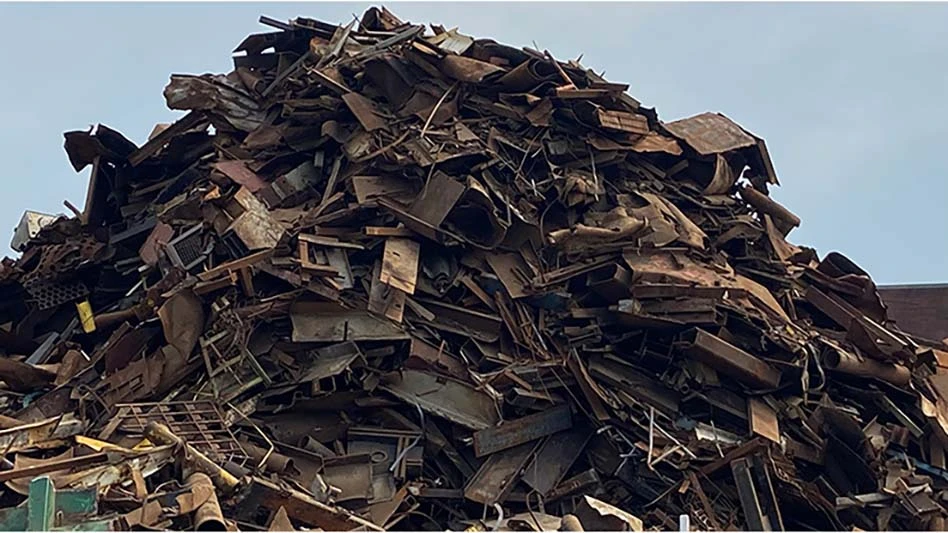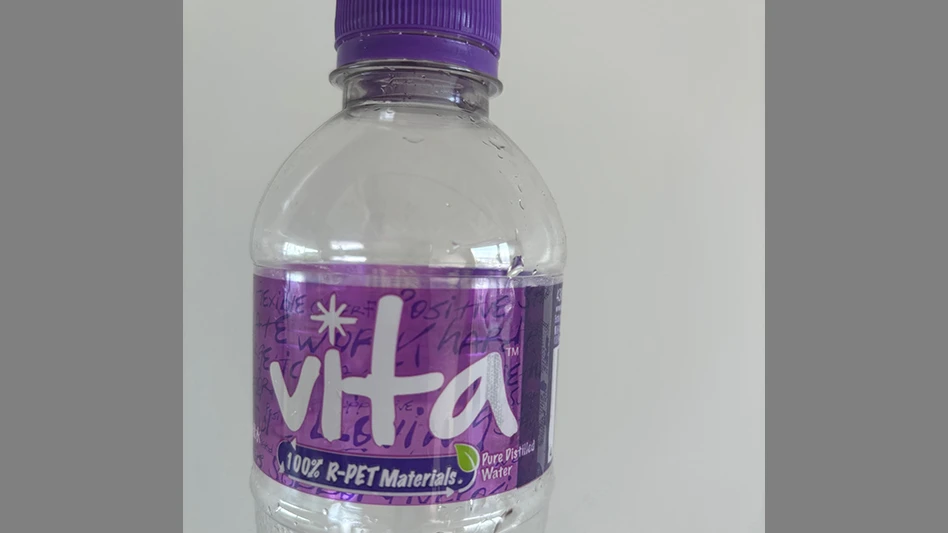 West Nyack, N.Y.-based C & A Carbone first made headlines in the early 1990s when the recycling company took its case against the flow control law in Clarkstown, N.Y., to the U.S. Supreme Court.
West Nyack, N.Y.-based C & A Carbone first made headlines in the early 1990s when the recycling company took its case against the flow control law in Clarkstown, N.Y., to the U.S. Supreme Court.
The Clarkstown flow control law was designed to help finance a new transfer station in the town and guaranteed a specified amount of material would flow to the facility, which was built by a private contractor. The ordinance required all nonhazardous solid waste within the town to be deposited at the transfer station at a higher tipping fee than open market rates.
In mid-1994, the U.S. Supreme Court ruled that Clarkstown's flow control law violated the Commerce Clause of the U.S. Constitution, which prohibits states and local governments from passing laws that discriminate against or greatly burden interstate commerce.
The U.S. Supreme Court again weighed in on flow control legislation in two New York counties in 2007. That case, United Haulers Association Inc. et al vs. Oneida-Herkimer Solid Waste Management Authority et al, carved out an exception for publically owned and operated waste management facilities.
"In that case, it was a local governmental entity that owned and operated the waste disposal facilities that were the beneficiaries of the flow control law," says David Biderman, general counsel for the National Solid Waste Management Association (NSWMA), Washington, D.C.
The District Court ruling in the United Haulers case found that nearly all flow control laws had been categorically rejected under the U.S. Supreme Court's decision in C & A Carbone Inc. vs. Clarkstown, where the court held that an ordinance forcing haulers to deliver material to a particular private facility discriminated against interstate commerce. Reversing that decision, the Second Circuit Court said Carbone and other of this court's dormant Commerce Clause precedents allow for a distinction between laws that benefit public, as opposed to private, facilities. The Supreme Court upheld this decision.
Biderman says, "The Supreme Court in its decision specifically says in the very first paragraph that what is different is that the fact that the facilities at issue here are owned and operated by a local government. That is a critical distinction in understanding the flow control case law and where we might go in the future in this area."
Joanne Wiley is the compliance officer with C & A Carbone. She credits the ruling in the Clarkstown case with reinvigorating the solid waste industry. "It broke open the marketplace. IPOs (initial public offerings) were being issued," she says. "There are not going to be any IPOs if you have walls around each county. There is nothing incentivizing companies to grow and invest."
More than 20 years after first challenging flow control in court, C & A Carbone again finds itself in a legal battle regarding flow control legislation. This time, the defendant is Rockland County, N.Y.
The Current Case
The Rockland County legislature adopted its flow control law May 20, 2008. The law regulates the "collection and disposition of solid waste generated in Rockland County, including garbage, recyclables, construction and demolition debris and yard waste," mandating that waste generated in the county be delivered to facilities designated by Rockland County Solid Waste Management Authority.
The Commissioner of the Department of Health can impose administrative sanctions or civil penalties of up to $1,000 if a hauler fails to comply with the regulation. The law also calls for formal hearings on violations.
According to www.co.rockland.ny.us/health, the website of the Rockland County Department of Health, the department responsible for enforcing the flow control law, the regulation "seeks to increase the rate of recycling in the county and provide[s] for the safe and environmentally sound handling and disposal of the solid waste generated in Rockland County."
While neither the Rockland County Legislature nor the Rockland County Department of Health responded to interview requests, the legislative intent is spelled out in the regulation:
"Flow control is needed so that environmentally beneficial management options which are not economically appealing to the waste management industry, such as source reduction, resource recovery and alternative solid waste processing technologies, can be implemented. Flow control will further the goals of protecting the public health, safety and welfare of the citizens of Rockland County from offensive materials by regulating the removal, transportation and disposal of solid waste and reducing the amount of infected and contaminated solid waste that would require special processing.
"More than 16 years after the adoption of its integrated solid waste management plan in September 1991, the county desires to further increase its rate of recycling and to implement an alternative solid waste processing technology with the goal of eliminating or severely reducing the amount of county generated waste that needs to be disposed of in landfills. Flow control will guarantee the quantity of waste to make the implementation of an alternative solid waste processing technology a viable goal and serve important environmental and public health, welfare and safety objectives."
Biderman says Rockland County owns the solid waste management facilities to which waste and recyclables generated in the county are being directed; however, the facilities are operated by private companies. "They take the position that the Supreme Court's decision in the United-Herkimer case only means ownership; it doesn't matter who operates the facility," he says of the Rockland County legislators. "This is contrary to the plain language of that decision."
Scott Horne, general counsel and vice president of government relations for the Institute of Scrap Recycling Industries Inc., Washington, D.C., says the Rockland County flow control law as written is "somewhat strange." He continues, "Clearly, whoever wrote it was trying to fit the square peg of Rockland County into that small carve out, maybe not that small, that Justice Roberts created in the Oneida case."
Recyclables at Issue
In addition to this fundamental question, the flow control ordinance in Rockland County raises a secondary issue in that it not only governs the flow of solid waste generated in the county but also the flow of recyclables. "Unlike other flow control laws, which only try to get their arms around the garbage, Rockland County is trying to create a monopoly on recycling in Rockland County," Biderman says. "There is some question as to whether or not local governments can flow control recyclables."
He adds, "With recyclables being an increasingly valuable commodity, this is an issue of increasing economic importance to the private sector."
Horne says, although the ordinance encompasses recyclables, the Rockland County legislation has a "big box carve out" for recyclables generated by these retailers, which exempts this material from the law.
C & A Carbone's Wiley says her understanding is that the exemption applies to entities meeting specific criteria, including having a recycling program in place before June 30, 2008. She says she thinks the exemption would exclude big box stores constructed after that date and those that did not have a recycling program in place before the specified date.
Given the investment that private recycling companies have made in processing technology for their material recovery facilities (MRFs), the legislation has the potential to cause significant financial harm. "A lot of private companies have made big investments in MRFs throughout the country, and now it is potentially possible that local governments are going to try to grab these valuable commodities and force them through their facilities and leave the private sector hanging out to dry," Biderman says. "That is bad public policy, it isn't fair and it raises some fundamental questions about what the appropriate role of the public sector is in solid waste management."
Wiley says private entities assume much of the risk when it comes to recycling and are responsible for many of the improvements in this sector. She says flow control legislation does not give government entities the incentive to operate more economically or efficiently. "Governments can simply say, 'We own all the waste, so let's raise the gate rate, and we have more money.'"
While local governments have historically played a role in the disposal of solid waste, the same cannot be said for recycling, Biderman says. With the relatively high value of secondary commodities, he says the motivation behind the law is clear. "With recycling it is all about the money, it is all about the revenue." Biderman continues, "There is no data that suggests that having local governments process recyclables yields more recyclables or better recyclables than the private sector. In fact, the EPA did a study a while ago that concluded that having flow control doesn't yield more recyclables."
While this study was released in 1995 and has not been updated since, Biderman says, "I would suggest that not only has nothing changed in regard to that conclusion, but I think that there is a fair amount of evidence that supports the idea that flow control not only is not necessary for recycling but can be a detriment to recycling."
After Carbone vs. Clarkstown, hundreds of flow control laws had to stop being enforced, Biderman says, yet the recycling rate in this country rose dramatically. "If you have a facility that has flow control and it's reliant on all of this material coming in to be disposed of, it creates a disincentive to take a portion of the waste stream and recycle it," he adds.
Wiley argues that flow control laws could discourage commercial customers from recycling because they may no longer see economic benefits. She says commercial and industrial customers that expect aggressive rebates for their recyclables may realize less revenue and may no longer be motivated to recycle as a result of the Rockland County legislation.
"I believe the big jump in recycling happens when you incentivize businesses," Wiley says. "You eliminate this private activity, and what happens is investment doesn't come into counties, jobs go down and taxes to the government go down. I don't see any benefit to it at all."
Horne says ISRI takes the position that recyclables are the property of the generator. "That owner should have every opportunity to do with their own personal property what they please. If an owner makes a conscious decision to put it into that system, then once that occurs, the governmental entity has the right to direct the flow however it wants to. Until such a decision is made, and it is a conscious decision, someone should be able to do whatever they want with it."
Dollars and Sense
The intrinsic value of recyclables is attractive to local legislators, Horne says. "There is a potential revenue stream that the governmental entities see, and that is what is driving them," he says. "The problem in the end is that what they are doing is unconstitutional because they are trying to legislatively change the rules of property law."
Horne adds, "Scrap is not waste, and recycling is not disposal. That is really at the crux of the issue. When they try to impose flow control on scrap and use the public health and welfare arguments that they use to try to exert flow control over solid waste, those arguments are so much weaker because you have personal property rights involved."
The principal benefit of flow control ordinances to local governments is that they generate revenue that helps fund solid waste related programs, Biderman says. "Local governments claim that there are environmental benefits to having flow control. I have never seen any data that suggest that local government owned disposal facilities operate in a more environmentally compliant manner than in the private sector."
Additionally, in many places where flow control ordinances are enacted, businesses and residents pay above-market fees to dispose of garbage. Biderman says, "In New Jersey before flow control laws were eliminated or invalidated, municipalities charged $100 per ton for waste disposal. Private entities were charging less than half of that."
Wiley adds, "Right now you have counties that are waste flowed in New Jersey that are charging $80 to $100 per ton for disposal. In non-waste-flowed counties where the towns are able to put out municipal bids for their waste, it averages $65 per ton for disposal."
Biderman predicts that flow control legislation will continue to be enforced and enacted in areas where local governments own and operate waste facilities.
If recyclables are affected by such ordinances, Horne advises members of ISRI to get in touch with the organization as soon as possible. "We have strategies to encourage the government entities to back off on enforcement as it relates to recyclables or to amend the regulation," he says. "We have a toolbox, if you will, with a number of things we can do to help them and their local legal counsel."
In the meantime, the industry can watch the progress of the Rockland County case. Biderman says the case currently is in the discovery stage, with depositions likely later this year. Legal motions for summary judgment will likely be filed in mid-2012, he adds, predicting that a decision from a federal district judge is at least a year away.
The author is managing editor of Recycling Today and can be contacted at dtoto@gie.net.

Explore the September 2011 Issue
Check out more from this issue and find your next story to read.
Latest from Recycling Today
- Two factors raise ferrous export questions in April
- Analyst: Scrap imbalance lost amid copper’s critical status
- AF&PA report shows decrease in packaging paper shipments
- GreenMantra names new CEO
- Agilyx says Styrenyx technology reduces carbon footprint in styrene production
- SABIC’s Trucircle PE used for greenhouse roofing
- Hydro to add wire rod casthouse in Norway
- Hindalco to invest in copper, aluminum business in India





